Anything going on in the world over the last two weeks? With our now 6-year-old being home schooled a few inches away from me — by me — the Aisle Seat has gone into full quarantine mode, all the while my wife is dealing with assorted daily issues at our local hospital. Undaunted, this column will continue — as will our daily discussions on the Aisle Seat Message Board — particularly because home entertainment isn’t taking a break…in fact, it’s the only mode of entertainment left at this point! So, here’s my latest rundown of new & upcoming releases, which should be available to purchase now….especially if you bundle an Amazon order with a coveted box of toilet paper, which as we’re all too aware, is a “hot” commodity at this point in time.
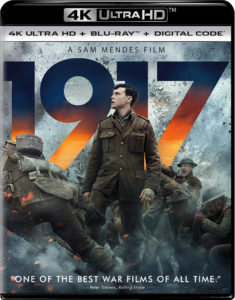 There aren’t a lot of opportunities to talk about movies that push storytelling boundaries and employ technology in new and exciting ways, but Sam Mendes’ spectacular 1917 (****, 119 mins., 2019, R; Universal) is happily one of those instances. A unique war movie that works as – and was intended to be – an immersive cinematic experience, this is a truly breathtaking piece of filmmaking – a dazzling trip into the battlefields of WWI that’s – no offense to Oscar-winning “Parasite" – unquestionably the best film of this past year (or the last few, for that matter).
There aren’t a lot of opportunities to talk about movies that push storytelling boundaries and employ technology in new and exciting ways, but Sam Mendes’ spectacular 1917 (****, 119 mins., 2019, R; Universal) is happily one of those instances. A unique war movie that works as – and was intended to be – an immersive cinematic experience, this is a truly breathtaking piece of filmmaking – a dazzling trip into the battlefields of WWI that’s – no offense to Oscar-winning “Parasite" – unquestionably the best film of this past year (or the last few, for that matter).
In Mendes and Krysty Wilson-Cairns’ screenplay – based on stories told to Mendes by his grandfather – a pair of British soldiers (George MacKay, Dean-Charles Chapman) are tasked with delivering a message behind enemy lines in northern France. The retreating German forces, they’ve been told, have backed up only to fortify a more advantageous strategic location – making the British battalion they have to find believe they’re “on the run” but are, instead, being intentionally directed towards a trap. The duo – one more world-weary than the other – must battle the elements, rogue German soldiers, and other assorted perils en route to finding – and stopping – that battalion of some 1500 men, ready to assault at dawn.
With Mendes working alongside the great cinematographer Roger Deakins, “1917” has been designed to bring the viewer into, and inside, its straightforward premise in a manner only today’s technology would allow. Shot as one continuous take, the flowing, and masterfully executed, visual design proves to be fascinating all by itself: locations are laid out as if you’re traversing an actual map – a tree blocking a roadway in one shot becomes an obstacle being removed by soldiers several minutes later – and it’s all executed so brilliantly that you may drift away from the story to ponder just how it was done. Yet it’s also a testament to Mendes and Deakins’ work that, as the film progressed, I found myself no longer looking for the seams and truly accepted that the camera was really following these young men through the actual battlefields of the war in one flowing, “real time” movement.
It’s also more of a war-time adventure, a story of survival, than a film that follows the conventions of most genre movies. If you’re looking for the WWI equivalent of “Saving Private Ryan,” you’re going to be disappointed – the movie certainly paints a brutal portrait of its era, but its R rating is virtually more warranted for profanity than gore. The characters traverse its environments mostly on the periphery of conflict, skirting the dead, the wounded and those affected by the battle – along the way there are moments of introspection, but don’t expect the pretentious poetry of “The Thin Red Line” either. Mendes keeps the movie moving, constantly, pausing for moments of unfortunate tragedy, stopping occasionally for a flash of fortuitous fate (such as Mackay’s meeting with a young French girl hiding in her bombed-out village) – yet sticking to its thesis that the war is going to be won by the last man standing.
The message is clear, yet “1917” conveys it in an unpretentious manner that puts filmmaking first and foremost. This is a masterpiece of visual storytelling, showing that new technology can invigorate historical settings as well as the generic Hollywood franchise film when placed in the hands of master filmmakers. We all know that there aren’t a lot of them left, which makes “1917” such a movie-going experience to savor.
Universal’s 4K UHD (HVEC encode with HDR and Dolby Vision) and Blu-Ray (1080p AVC) both offer superb a/v presentations, though the UHD’s usage of HDR trumps its standard BD transfer. Colors, explosions, and the overall look of the image possesses an added dimension when viewed on a quality 4K HDTV. Both discs offer the same, marvelously mixed Dolby Atmos soundtrack, which is fully immersive throughout. In addition to a Digital HD code, extras include a series of very brief featurettes lightly detailing the extraordinary production of the film and a quick glimpse at Thomas Newman’s scoring as well.
 STAR WARS: THE RISE OF SKYWALKER 4K UHD/Blu-Ray (**½, 142 mins., 2019, PG; Lucasfilm/Disney): Brought back to salvage the concluding chapter in Disney’s so-called “Skywalker” series, director J.J. Abrams does something interesting with “The Rise of Skywalker”: he and co-writer Chris Terrio basically act as if its tepid, divisive Rian Johnson-helmed predecessor, “The Last Jedi,” never existed. Did that visit to the intergalactic casino ever happen? Where are the “Jedi Kids”? Are characters played by Laura Dern and Benicio Del Toro even canon now?
STAR WARS: THE RISE OF SKYWALKER 4K UHD/Blu-Ray (**½, 142 mins., 2019, PG; Lucasfilm/Disney): Brought back to salvage the concluding chapter in Disney’s so-called “Skywalker” series, director J.J. Abrams does something interesting with “The Rise of Skywalker”: he and co-writer Chris Terrio basically act as if its tepid, divisive Rian Johnson-helmed predecessor, “The Last Jedi,” never existed. Did that visit to the intergalactic casino ever happen? Where are the “Jedi Kids”? Are characters played by Laura Dern and Benicio Del Toro even canon now?
“Episode IX” plays like a direct sequel to Abrams’ “The Force Awakens,” or at the least, a second installment he didn’t get to make – tonally, visually, it “fits” with that film, while avoiding basically anything to do with “The Last Jedi” outside of where its characters are positioned at the outset. It even seems to go out of its way to avoid referencing anything that even happened in “Last Jedi,” while bringing back Abrams’ penchant for recycling material amongst a bevy of bland, forgettable action.
The plot – which evaporates so quickly that you’ll soon forget what the characters are even doing – finds Emperor Palpatine (Ian McDiarmid) back and among the living (don’t ask how this happens; a reprisal of dialogue from “Revnege of the Sith” is all you’ll get). In one of the movie’s few interesting elements, it turns out the First Order is just a front for the revival of the Empire (surprise!), yet it would’ve been more effective had this material been incorporated to some degree in the previous picture. Out to stop him is Rey (Daisy Ridley), who’s basically become a full-fledged Jedi still wondering about her parents’ identity, as well as Kylo Ren (Adam Driver), now the First Order’s ranking leader but dubious about the newly-revived Emperor’s power grab.
“Skywalker” is unquestionably a more respectable, entertaining film than “The Last Jedi,” with its most satisfying attributes coming through the character arcs of Kylo and Rey. Driver proves to be the most compelling presence in these three films, with his conflicted nature and unpredictable performance bringing a much-needed shot of energy to all the scenes he’s in. While Ridley’s performance has basically become a flatline – she generates the same emotional response in scene after scene, seldom providing an indication of her heroine’s growth – her scenes with Driver still retain their interest.
Regrettably, their sequences are sabotaged by mostly banal action, boring supporting characters, and a maddening number of things that never pay off. Abrams struggles to find a function for either John Boyega’s Finn or Oscar Isaac’s Poe – so much that Finn’s repeated line “I’ve got to tell Rey something!” inexplicably has no resolution at all. Meanwhile, a kiss between two leads that does occur near the end generated widespread laughter and groans from the audience I was sitting with. Other characters come and go, mostly without any consequence (Keri Russell has a worthlessly underdeveloped role in particular), while Billy Dee Williams saunters in for a few minutes, looking as if he was trying to find the salad bar while dressed up in Lando Calrissian garb.
To his credit, Abrams does provide some interesting visual flourishes – a light-saber duel on the downed remnants of the second Death Star is played out against a turbulent sea with humongous waves – and a mercifully short reprisal of original trilogy star appearances, Lando notwithstanding.
What it all amounts to, though, is a disconnected trilogy that doesn’t function as a cohesive whole, the product of focus groups, studio executive notes and Disney’s corporate filmmaking mentality – there’s no doubt the studio’s investment in release dates, as opposed to screenplays, was clearly felt here. While Abrams is no Lucas, one gets the sense had he been employed to shepherd the story through the second film (instead of hiring/firing Colin Trevorrow and then bringing in Rian Johnson, who should’ve been axed), this trilogy may have had a fighting chance to at least function more coherently than it ultimately does.
When “The Force Awakens” hit theaters in 2015, many fans felt the rush of nostalgia and flocked to the film – yet with 5 movies having been cranked out in four years, it’s safe to say that thrill is now gone (sadly that sentiment can be felt with John Williams’ music as well, which disappointingly falls flat here). Regardless of what you think about George Lucas, there was a point to both of his Star Wars trilogies, and a cogent message that these Disney films mimics but doesn’t entirely comprehend. His creative impulse remains part of a cinematic realm far, far away from 2019.
Disney’s 4K UHD release of “Skywalker” falls in line with their prior, high-quality UHD releases of the series, boasting HDR and Dolby Atmos audio. Colors and lighting effects are enhanced over the included, prior 1080p Blu-Ray, and the Atmos audio is precisely mixed and involving with its directional effects. “The Skywalker Legacy” documentary is a mostly fluffy, if feature-length, examination behind the scenes, though the lack of deleted scenes seems to indicate another version with added content might follow down the line. The BD and a Digital HD copy is also included, with a segment on Williams in “The Maestro’s Finale” being an exclusive digital bonus not included in physical format.
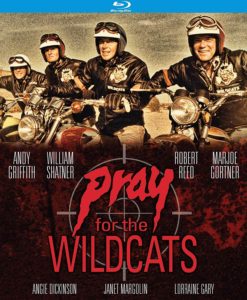 New From Kino Lorber
New From Kino Lorber
PRAY FOR THE WILDCATS Blu-Ray (92 mins., 1971; Kino Lorber): It’s an early ’70s version of “Glengarry Glenn Ross” – with just a touch of “Deliverance” – when a group of advertising execs head to Baja, each running away from assorted domestic issues. They include, in his worst hairpiece ever, William Shatner, about to be fired and having just engaged in an affair with the wife (Angie Dickinson) of his co-worker (Robert Reed), also on the trip; and Marjoe Gortner, whose girlfriend (Janet Margolin) has just divulged her unexpected pregnancy. All three are saddled with a fast-talking, borderline psychotic client (Andy Griffith) who’s looking for trouble, girls, booze and other flights of machismo, and not necessarily in that order.
Especially considering the subject matter, the cast of “Pray For the Wildcats” holds an enormous amount of appeal – what’s not to love about a pudgy, droopy-looking Shatner trying to maintain his domestic sanity with his wife (a pre-”Jaws” Lorraine Gary) while trying to convince a post-”Brady Bunch” Reed to deal with the increasingly unhinged Griffith. Speaking of Andy, he’s about as far from Mayberry as you can get, playing an atypically slimy tycoon who eventually loses it after running into a hippie and his dancing girlfriend south of the border.
You’d expect the entertainment value from that plot description to be obvious, though this ABC TV-movie is mostly a dour, downbeat affair. Jack Turley’s script portrays the societal climb up the corporate ladder as an endless pit of narcissism, embodied most particularly by Griffith’s portrayal of toxic masculinity. Sadly, there’s too much motorcycle and not enough dramatic tension in the movie’s second half, with Griffith’s most surprising act not even occurring on-camera. Director Robert Michael Lewis is able to coax convincing performances of the cast, but the mood is so glum – punctuated by Fred Myrow’s at-times unintentionally funny score – that the “fun factor” isn’t nearly as high as you might hope.
Kino Lorber’s Blu-Ray (1.33) is nevertheless well worth a look for the curious – the Disney-licensed master is in solid shape with crisp detail and generally superb elements. The sole extra is a commentary from movie historians Amanda Reyes and Bill Ackerman.
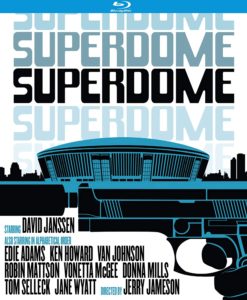 SUPERDOME Blu-Ray (97 mins., 1978; Kino Lorber): Another ’70s TV movie debuts in high-def this month thanks to Kino Lorber. “Superdome” was shot on-location in New Orleans and stars David Janssen as the manager of a pro football team on its way to the Big Easy for the big game – complete with stars Bubba Smith and Dick Butkus in tow – when an assassin shows up, severely hampering their championship chances. This premise should be enough to carry a two-hour TV movie, but writer Barry Oringer and director Jerry Jameson throw in so many peripheral plots – Ken Howard and Susan Howard’s crumbling marriage, Tom Selleck’s suspicious business deals – that the end result is a convoluted, surprisingly unfocused piece that fumbles away most of its entertainment opportunities, much like a watered-down, network version of “Two Minute Warning.”
SUPERDOME Blu-Ray (97 mins., 1978; Kino Lorber): Another ’70s TV movie debuts in high-def this month thanks to Kino Lorber. “Superdome” was shot on-location in New Orleans and stars David Janssen as the manager of a pro football team on its way to the Big Easy for the big game – complete with stars Bubba Smith and Dick Butkus in tow – when an assassin shows up, severely hampering their championship chances. This premise should be enough to carry a two-hour TV movie, but writer Barry Oringer and director Jerry Jameson throw in so many peripheral plots – Ken Howard and Susan Howard’s crumbling marriage, Tom Selleck’s suspicious business deals – that the end result is a convoluted, surprisingly unfocused piece that fumbles away most of its entertainment opportunities, much like a watered-down, network version of “Two Minute Warning.”
Co-starring Edie Adams, Clifton Davis, Van Johnson, Vonetta McGee, Donna Mills, Ed Nelson, and Jane Wyatt, “Superdome” may still be of interest for devotees of the era in spite of its shortcomings. Kino Lorber’s Blu-Ray (1.33) is a good-looking Disney-licensed master with extras including a welcome commentary by Howard S. Berger and Steve Mitchell with Jerry Jameson discussing the film and his career.
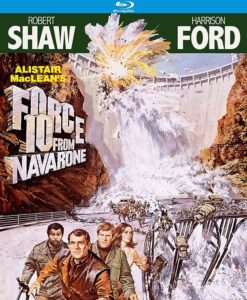 FORCE 10 FROM NAVARONE Blu-Ray (126 mins., 1978, PG; Kino Lorber): Belated sequel to “The Guns of Navarone” took an eternity to get produced – surprising given that its predecessor was one of the big action hits of the ’60s. This follow-up, independently produced by German financier Oliver Unger – who received split funding from American-International (for North American release), Columbia (worldwide territories) and ABC (TV broadcast) – isn’t nearly as good, but nevertheless functions as a passable WWII adventure out of step with its time.
FORCE 10 FROM NAVARONE Blu-Ray (126 mins., 1978, PG; Kino Lorber): Belated sequel to “The Guns of Navarone” took an eternity to get produced – surprising given that its predecessor was one of the big action hits of the ’60s. This follow-up, independently produced by German financier Oliver Unger – who received split funding from American-International (for North American release), Columbia (worldwide territories) and ABC (TV broadcast) – isn’t nearly as good, but nevertheless functions as a passable WWII adventure out of step with its time.
Robert Shaw may not seem like a suitable replacement for Gregory Peck on paper, but Shaw – in one of his final roles – is quite effective here in an atypically energetic, “heroic” role (despite him moving wobbly at times). James Fox is fine subbing for David Niven, with the duo tasked with taking out a traitor (Franco Nero) who betrayed them on Navarone in the previous adaptation of Alastair MacLean’s novels. Meanwhile, the separate Allied mission they’re attached to is fronted by American colonel Harrison Ford, just out of the Millennium Falcon and here charged with blowing up a Yugoslav bridge pertinent to the German forces. Carl Weathers, fresh off “Rocky,” co-stars with James Bond series vets Barbara Bach and Richard Kiel as local partisans whose allegiances one can never be entirely trusting of in a film helmed by Guy Hamilton – who took this project after he was forced to bow out of “Superman: The Movie” due to the UK’s tax laws at the time.
“Force 10 From Navarone”’s first hour is entertaining and more involving than its second half, which degenerates into a lot of running around in dimly-lit sets that set up the movie’s climactic action finale. It’s probably no surprise, either, that the picture wasn’t a box-office success, since the genre was worn-out by the late ’70s and audiences had moved on to adventures in outer space. All that being said, the picture is certainly watchable with a few fun flourishes, particularly because of its cast and Ron Goodwin’s score – elements all enhanced in Kino Lorber’s new Blu-Ray.
I’ve owned two prior releases of “Force 10” in the format: MGM’s domestic Blu-Ray, which featured an atrociously noisy and misframed old master, as well as Sony’s international release, which was properly framed but offered an overly bluish tint (as well as some sequences that were excessively dark).
This new 2K master (2.35), however, is a big improvement on both: flesh tones are more varied and naturalistic than the Sony disc, while the framing is consistent with the latter and not the poor, older MGM release. The 5.1 and 2.0 DTS MA sound offerings are peculiar in that they’re mostly mono with occasional (though not consistent) left/right effects, though they’re both perfectly acceptable. Extras include the trailer and a commentary from Steve Mitchell and Steven Jay Rubin; fans should note the film is presented in its full length 126-minute European cut with the Columbia release logo, but with the U.S. opening credits (listing Arkoff and Unger instead of Columbia) spliced into the master.
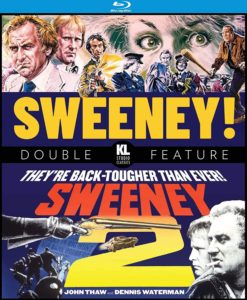 SWEENEY! SWEENEY 2 Blu-Ray Double Feature (97/108 mins.., 1977-78; Kino Lorber): Fans of the ’70s British TV series should be pleased with this single-disc Blu-Ray coupling the show’s two theatrical spin-offs.
SWEENEY! SWEENEY 2 Blu-Ray Double Feature (97/108 mins.., 1977-78; Kino Lorber): Fans of the ’70s British TV series should be pleased with this single-disc Blu-Ray coupling the show’s two theatrical spin-offs.
John Thaw stars as irrepressible Scotland Yard detective Jack Regan, who works alongside George Carter (Dennis Waterman) to expose corruption as they bring justice to the seedier side of London crime. The first “Sweeney!” finds Regan tracking down a politician (Ian Bannen) who’s been implicated in the fabricated murder-suicide of his mistress, all orchestrated by his even more corrupt American Chief of Staff (Barry Foster). In “Sweeney 2,” Regan and Carter are tasked with taking down a crew of mercenaries robbing London banks, with everyone from the Maltese government to more crooked cops involved; here, the “Guest Stars” include Denholm Elliott, Ken Hutchison and Anna Gael.
Being in the U.S., my exposure to the gritty “Sweeney” has been non-existent – and judging from some of the reviews I’ve read, these two EMI-produced features aren’t necessarily a good gateway into it. This is especially true of the first feature, which feels like an extended episode of an hour-long series, having to fill up dead space with bloated writing and lethargic pacing. Even the ending is a narcissistic downer that the two leads, reportedly, didn’t care for. Eschewing the downbeat political intrigue of its predecessor, “Sweeney 2” apparently falls more in line with the show’s typical episodic formula, though there are times the enhanced violence and sex feel as if they’ve been thrown in just for the sake of sensationalism, while the feature seems even more prolonged at 108 minutes.
It goes without saying, then, that fans of the series will get the most excitement from seeing these 1977-78 features on Blu-Ray, where Kino Lorber has served up clean 1080p (1.66/1.78) masters licensed from Studio Canal. Extras include trailers and commentary tracks from critic Simon Abrams.
 Catalog Corner
Catalog Corner
THEIR FINEST HOUR Blu-Ray 5-Film Box Set (Film Movement): WWII buffs ought to be delighted with this five-disc Blu-Ray anthology now available from Film Movement.
This new box offers Studio Canal-licensed British titles “Went the Day Well?,” a 1942 tale of an English village taking on German soldiers (shades of “The Eagle Has Landed”); the Guy Hamilton 1955 drama “The Colditz Story” starring John Mills; Michael Anderson’s well-regarded – if a bit stiff – feature “The Dam Busters,” also from 1955; Mills and Richard Attenborough in the 1958 version of “Dunkirk”; and Mills and Harry Andrews in J. Lee Thompson’s African-set 1958 adventure “Ice Cold in Alex.” All titles were remastered by Studio Canal and are presented here in 1080p transfers (1.33 on the initial three titles, 1.66 on the latter two) with a 24-page booklet by Cullen Gallagher. Ample extras have been carried over from assorted DVD editions, making for a must-have for genre enthusiasts.
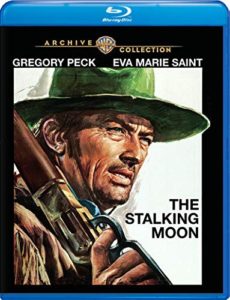 New From Warner Archive: Reuniting Gregory Peck with his “To Kill a Mockingbird” filmmaking tandem of director Robert Mulligan and producer Alan J. Pakula, THE STALKING MOON (109 mins., 1969, G) is a minor western featuring Peck as a scout trying to transport a damaged, former Indian captive (Eva Marie Saint) and her half-breed son across the Southwest while dodging the boy’s father, a renegade Apache looking for vengeance – and his son.
New From Warner Archive: Reuniting Gregory Peck with his “To Kill a Mockingbird” filmmaking tandem of director Robert Mulligan and producer Alan J. Pakula, THE STALKING MOON (109 mins., 1969, G) is a minor western featuring Peck as a scout trying to transport a damaged, former Indian captive (Eva Marie Saint) and her half-breed son across the Southwest while dodging the boy’s father, a renegade Apache looking for vengeance – and his son.
Mulligan and cinematographer Charles Lang have fashioned an impressive looking film with fine location work and convincing performances from Peck and Saint. Alvin Sargent’s script, adapted from a novel by Theodore V. Olsen, may have also worked fine in the hands of another director, yet it’s pretty clear Mulligan is more at home with the movie’s low-key character dramatics as opposed to its western conventions and action scenes – sequences which move extremely slowly and feel far too subdued for their own good. The entire tone of the film feels a little heavy-handed as well: by the late ’60s the western genre was undergoing a shift towards “enlightened” stories and the genial nature of Peck and most of the American soldiers portrayed in the film seem like a result of cliches of a different sort – those related to Hollywood revisionism – as opposed to being any more realistic than the usual Saturday Matinee fare that preceded it.
The net result just kind of sits there and drags – there’s not a lot of emotional attachment one ever feels towards the characters, and this perfunctory – if technically adept – feel emanating from “The Stalking Moon” carries over to Fred Karlin’s scoring, an area where you wish Mulligan and Pakula had retained the services of Elmer Bernstein instead.
Warner Archive’s Blu-Ray (2.35) includes a stellar 1080p transfer that’s clearly been struck from a newish master. Details are crystal clear, colors are satisfying and the film basically looks as if it could’ve been made yesterday. The clear DTS MA mono is similarly flawless.
Also new from Warner Archive is the 1954 MGM drama BEAU BRUMMELL (113 mins.), an adaptation by Karl Tunberg of Clyde Fitch’s 1890 play, previously brought to the screen in the 1920s as a silent vehicle for John Barrymore. Stewart Granger here essays the captain who strikes up a relationship with the Prince of Wales (Peter Ustinov), infiltrates his inner-circle, establishes its era’s fashion, falls for the lovely Elizabeth Taylor, then is ostracized and eventually dies. It’s a sappy, melodramatic tale co-starring Robert Morley and scored by Richard Addinsell and an uncredited Miklos Rozsa, who rescored the film’s opening and climactic ending for his friend, producer Sam Zimbalist. The lavish MGM production values – with splendidly utilized English locations – are on full display in Warner Archive’s Blu-Ray (1.75), sporting a 2.0 DTS MA stereo soundtrack in a lovely new transfer.
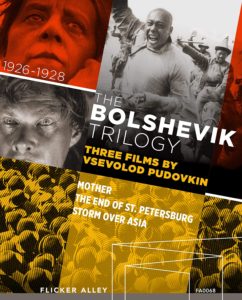 THE BOLKSHEVIK TRILOGY Blu-Ray (291 mins., 1926-28; Flicker Alley): Silent movie buffs should be highly pleased with Flicker Alley’s deluxe, two-disc Blu-Ray of three late ’20s films from Russian director Vsevolod Pudovkin.
THE BOLKSHEVIK TRILOGY Blu-Ray (291 mins., 1926-28; Flicker Alley): Silent movie buffs should be highly pleased with Flicker Alley’s deluxe, two-disc Blu-Ray of three late ’20s films from Russian director Vsevolod Pudovkin.
Included in this edition are “Mother” (87 mins., 1926), based on Maxim Gorky’s book and featuring a piano score by Antonio Coppola; “The End of St. Petersburg” (73 mins., 1927), shot to commemorate the October Revolution’s 10th anniversary, with an orchestral score provided by Vladimir Yurovsky; and “Storm Over Asia” (131 mins., 1928), which boasts a 2K scan from 35mm preservation elements, along with a rousing Timothy Brock orchestral score performed by the Olympia Chamber Orchestra.
Supplemental features include a commentary by historian Jan-Christopher Horak on “Storm Over Asia” and a talk on “Mother” by historian Peter Bagrov. Also included are “Chess Fever,” Pudovkin’s 1925 directorial debut; the 1930 “Amateur Images of St. Petersburg”; “Notebooks of a Tourist Presents: St. Petersburg” (1920); Maxim Pozdorovkin’s visual essay “A Revolution in Five Moves”; a look at Pudovkin’s editorial techniques; and an illustrated booklet featuring an essay from author Amy Sargeant.
Also new from Flicker Alley this month is 3-D RARITIES II, a follow-up to the 3-D Film Archive's previous, and quite wonderful, 3D Blu-Ray anthology of vintage stereoscopic shorts. This new edition offers 2½ hours of content from 1941-83, including “A Day in the Country,” Raymond Spottiswoode's “The Black Swan,” Hillary Hess' “Mid-Century Rarities in Kodachrome Stereo”; “Games in Depth”; the rare 3D prologue to the Euro horror “Frankenstein's Bloody Terror”; and a trailer for “The 3-D Movie,” a long-forgotten 1983 anthology of classic shorts. The first 3D movie ever produced in Mexico, “El Corazon y la Espada,” hasn't been seen in its native format since 1955, but it's also here – newly scanned in 4K and featuring frame-by-frame restorative work for this early Cesar Romero release. Finally, the disc is capped by homemade 3D photograph slides that were taken by the great comic Harold Lloyd, and are introduced by his granddaughter – many of which have never been seen by the public. A souvenir booklet and commentaries on “El Corazon” and “The Black Swan” put the cap on a must for 3D format enthusiasts.
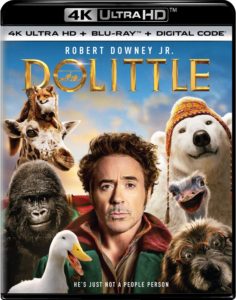 Also New & Noteworthy
Also New & Noteworthy
DOLITTLE 4K Ultra HD/Blu-Ray (102 mins., 2020, PG; Universal): Heavily worked-over, expensive star vehicle for Robert Downey, Jr. bounced around the release schedule and underwent extensive reshoots before landing in theaters this past winter. On the surface, the movie did OK but not in relation to its high budget, which had instantly branded the movie as a flop before it ever hit theater screens.
Debuting in a good looking 4K UHD presentation with HDR10+, Dolby Vision and Dolby Atmos audio April 7th from Universal, “Dolittle” is visually impressive and layered with color – yet the fundamental problem is its charmless script and juvenile humor. Stephen Gaghan’s original intentions were reportedly “enhanced” by a number of added talking animals (voiced by an endless roster of talents, from Antonio Banderas to Rami Malek and Kumail Nanjiani) who wander in to provide mostly laugh-free lines, all the while Downey’s muddled accent is near incomprehensible throughout. It makes for a trite, pricey bomb that undemanding kids might find palatable for its duration, but that’s about it. Universal’s 4K UHD also includes the Blu-Ray, a Digital HD copy, and several featurettes, both in 4K and 1080p.
JUST MERCY Blu-Ray/DVD (137 mins., 2019, PG-13; Warner): Michael B. Jordan renders one of his strongest performances to date in this true story about a young, Harvard-educated lawyer (Jordan) who takes up the case of a black man (Jamie Foxx) on death row, having been convicted two years prior for the murder of a young white woman in Alabama. Urged on by a local advocate (Brie Larson), Jordan’s Bryan Stevenson finds a broken system with an unjustly accused man wrongly convicted of the crime – though he has to undergo a series of trials and setbacks, both from judicial and political quarters, in bringing justice finally to light. Stevenson’s book was the basis for this agreeable courtroom drama, which works based on the conviction of its performances and less so because of director Destin Daniel Cretton’s filmmaking skills. This is a somewhat erratic picture that has difficulty building momentum, though its story always remains compelling and Jordan is terrific. Warner’s Blu-Ray offers a fine 1080p transfer, Dolby Atmos audio, deleted scenes, three featurettes, a Digital HD copy and the DVD (streets April 14th; on digital sooner).
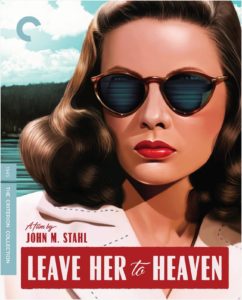 A film highly regarded as an unusual hybrid of film-noir and Hollywood melodrama, LEAVE HER TO HEAVEN (110 mins.; Criterion) is a hugely satisfying slice of Fox Technicolor filmmaking. Ben Ames Williams’ bestseller was adapted by Jo Swerling for John M. Stahl’s 1945 release, and charts the unpredictable – at first simply obsessive, then borderline maniacal – behavior of a Maine socialite (Gene Tierney, a precursor to other femme fatales like Glenn Close in “Fatal Attraction”) who quickly attaches herself to author Cornel Wilde while en route to New Mexico. Their courtship is so whirlwind that Wilde scarcely has the opportunity to propose before Tierney does it herself – in the face of her fiancee, attorney Vincent Price, at that. All Tierney wants to do is love…no matter what (Wilde’s disabled younger brother; Tierney’s sister Jeanne Crain) stands in her way, and whatever “Ellen” wants, she typically gets.
A film highly regarded as an unusual hybrid of film-noir and Hollywood melodrama, LEAVE HER TO HEAVEN (110 mins.; Criterion) is a hugely satisfying slice of Fox Technicolor filmmaking. Ben Ames Williams’ bestseller was adapted by Jo Swerling for John M. Stahl’s 1945 release, and charts the unpredictable – at first simply obsessive, then borderline maniacal – behavior of a Maine socialite (Gene Tierney, a precursor to other femme fatales like Glenn Close in “Fatal Attraction”) who quickly attaches herself to author Cornel Wilde while en route to New Mexico. Their courtship is so whirlwind that Wilde scarcely has the opportunity to propose before Tierney does it herself – in the face of her fiancee, attorney Vincent Price, at that. All Tierney wants to do is love…no matter what (Wilde’s disabled younger brother; Tierney’s sister Jeanne Crain) stands in her way, and whatever “Ellen” wants, she typically gets.
“Leave Her to Heaven” is gorgeous to look at and listen to, thanks to Alfred Newman’s dramatic underscoring and Leon Shamroy’s sparkling Technicolor cinematography. This is a splendidly performed, tartly written thriller with some adult themes that were shocking for the time (particularly in how Tierney deals with her pregnancy!), all of it resulting in a delectable entertainment. Golden Age fans, especially, ought to be highly pleased with the picture.
Twilight Time previously brought “Leave Her to Heaven” to Blu-Ray in a dynamic 1080p (1.33) transfer. I’m not sure if Criterion’s Blu-Ray was based on the same elements but it boasts a likewise superlative presentation, a 2K digital restoration with PCM mono audio. Slender extras include an interview with critic Imogen Sara Smith and the trailer.
 LITTLE WOMEN Blu-Ray (135 mins., 2019, PG; Sony): Greta Gerwig’s sparkling adaptation of Louisa May Alcott’s classic offers marvelous ensemble performances (Saoirse Ronan, Emma Watson, Florence Pugh, Eliza Scanlen), a real sense of time and place, and a certain verve about it that makes the picture far more than just a straight, stately rendition of the oft-adapted book. Gerwig’s dialogue is incisive and funny, and while there’s a bit of a contemporary component lurking under the surface of this particular version, there’s also an enormous amount of energy, making it easily one of last year’s best films. While Sony sadly passed on releasing “Little Women” in 4K UHD (despite its box-office success), they have produced a fine Blu-Ray (1.85, 5.1 DTS MA) with a handful of featurettes, a DVD, and Digital HD copy included.
LITTLE WOMEN Blu-Ray (135 mins., 2019, PG; Sony): Greta Gerwig’s sparkling adaptation of Louisa May Alcott’s classic offers marvelous ensemble performances (Saoirse Ronan, Emma Watson, Florence Pugh, Eliza Scanlen), a real sense of time and place, and a certain verve about it that makes the picture far more than just a straight, stately rendition of the oft-adapted book. Gerwig’s dialogue is incisive and funny, and while there’s a bit of a contemporary component lurking under the surface of this particular version, there’s also an enormous amount of energy, making it easily one of last year’s best films. While Sony sadly passed on releasing “Little Women” in 4K UHD (despite its box-office success), they have produced a fine Blu-Ray (1.85, 5.1 DTS MA) with a handful of featurettes, a DVD, and Digital HD copy included.
JUMANJI: THE NEXT LEVEL Blu-Ray (123 mins., 2019, PG-13; Sony): Mediocre sequel to the “Jumanji” revival brings back the same kids from the previous film with their star-powered alter-egos in tow – albeit here with the likes of Danny DeVito and Danny Glover “inhabiting” Dwayne Johnson and Kevin Hart. The group finds themselves having to brave new kingdoms and shut down a villain in the form of “Jurgen the Brutal” (Rory McCann) in the pseudo video-game world with Jake Kasdan returning to direct (he co-wrote with Jeff Pinkner and Scott Rosenberg). “The Next Level” offers little in the way of fresh content – and mostly rehashes its predecessor’s jokes – but it’s still appealing enough with good-natured performances again from its leads. Sony’s Blu-Ray (2.39, 5.1 DTS MA) is now available with a handful of extras, the DVD and a Digital HD copy also included.
 THE SONG OF NAMES Blu-Ray (113 mins., 2019, PG-13; Sony): Norman Lebrecht’s novel about a violin prodigy who’s orphaned during the Holocaust — disappearing before he’s about to perform a recital — only to resurface years later makes for a plodding film from Canadian director Francois Girard. There’s plenty of classical music — and an original score by Howard Shore — on-hand here, but the performances of Tim Roth and Clive Owen — as the adult versions of the film’s central characters — are lifeless and the drama stilted. Sony’s Blu-Ray (2.39, 5.1 DTS MA) includes the trailer and three featurettes, including a look at Shore’s work (prominently sold in the film’s promotion) on the barely-distributed picture.
THE SONG OF NAMES Blu-Ray (113 mins., 2019, PG-13; Sony): Norman Lebrecht’s novel about a violin prodigy who’s orphaned during the Holocaust — disappearing before he’s about to perform a recital — only to resurface years later makes for a plodding film from Canadian director Francois Girard. There’s plenty of classical music — and an original score by Howard Shore — on-hand here, but the performances of Tim Roth and Clive Owen — as the adult versions of the film’s central characters — are lifeless and the drama stilted. Sony’s Blu-Ray (2.39, 5.1 DTS MA) includes the trailer and three featurettes, including a look at Shore’s work (prominently sold in the film’s promotion) on the barely-distributed picture.
Lionsgate New Releases: William Shatner piques his curiosity across a variety of topics in the History Channel series THE UNEXPLAINED (6 hours, 2019), which debuts March 24th on DVD in a Season 1 package from Lionsgate. Shatner hosts and contributes interviews with a variety of experts on topics as diverse as Evil Places, Mysterious Structures, Strange Creatures, Unnatural Nature, Bizarre Rituals, Life Beyond Death, Mysteries of the Mind and Incredible Survivors. The two-disc set includes 16:9 transfers and 2.0 stereo soundtracks…the 3-Film Collection LOVE & TEMPTATION (2019) includes a trio of Lifetime original movies based on the books of author Jane Green. Included are “Tempting Fate” starring Alyssa Milano, “Family Pictures” featuring Justina Machado and Elisabeth Rohm, and “To Have and to Hold” starring Erika Christensen. The single-disc DVD offers 16:9 transfers and 2.0 stereo sound for all three 2019 features.
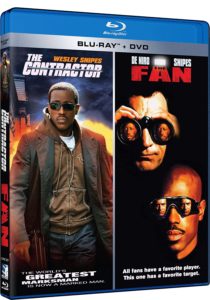 Mill Creek Blu-Ray New Releases: Back on Blu-Ray, John August’s THE NINES (99 mins., 2006, R) is an offbeat trio of tales staring Ryan Reynolds, Hope Davis and an effective Melissa McCarthy, each in three different roles. The label previously released the film in a Double Feature release back in 2013 – this standalone edition does offer a superior 1080p AVC (1.85) transfer with 2.0 DTS MA lossless audio…Debuting on Blu-Ray is Tony Scott’s tepid 1996 thriller THE FAN (116 mins., R), starring Wesley Snipes as Bobby Rayburn (no relation to Gene), a San Francisco Giants superstar outfielder stalked by psycho fan Robert DeNiro. Slickly shot in widescreen, “The Fan” is mostly a rote exercise with DeNiro traveling down the “Taxi Driver”/”Cape Fear” path one more time. Mostly forgotten since its original Summer ’96 release, “The Fan” debuts here on BD alongside the forgettable 2007 Snipes vehicle THE CONTRACTOR (99 mins., R) co-starring Lena Headey. The single-disc Mill Creek Double Feature includes 2.0 DTS MA audio and decent 1080p transfers (2.35/1.85).
Mill Creek Blu-Ray New Releases: Back on Blu-Ray, John August’s THE NINES (99 mins., 2006, R) is an offbeat trio of tales staring Ryan Reynolds, Hope Davis and an effective Melissa McCarthy, each in three different roles. The label previously released the film in a Double Feature release back in 2013 – this standalone edition does offer a superior 1080p AVC (1.85) transfer with 2.0 DTS MA lossless audio…Debuting on Blu-Ray is Tony Scott’s tepid 1996 thriller THE FAN (116 mins., R), starring Wesley Snipes as Bobby Rayburn (no relation to Gene), a San Francisco Giants superstar outfielder stalked by psycho fan Robert DeNiro. Slickly shot in widescreen, “The Fan” is mostly a rote exercise with DeNiro traveling down the “Taxi Driver”/”Cape Fear” path one more time. Mostly forgotten since its original Summer ’96 release, “The Fan” debuts here on BD alongside the forgettable 2007 Snipes vehicle THE CONTRACTOR (99 mins., R) co-starring Lena Headey. The single-disc Mill Creek Double Feature includes 2.0 DTS MA audio and decent 1080p transfers (2.35/1.85).
More “Ultraman” excitement is included with a pair of later “Ultraman” movies. ULTRAMAN ORB: THE MOVIE (71 mins.) and ULTRAMAN GEED: THE MOVIE (73 mins.) are both brand-new on Blu-Ray this month – both sporting 1080p (1.78) AVC encoded transfers with 2.0 Japanese DTS MA soundtracks and English subtitles. Moviespree app digital copies are also included.
THE NIGHT CLERK DVD (90 mins., 2020, R; Paramount): Tye Sheridan stars as a high-functioning young man with Autism who works as a hotel clerk. One night a girl is murdered during his shift, leading him to become the prime suspect -- yet the murderer is still out there, and he works with a guest (Ana De Armas) to find her/him before they strike again. Michael Cristofer helmed this independent production co-starring Helen Hunt and John Leguizamo, available on DVD April 7th from Paramount (16:9, 5.1). The disc includes a digital copy.
 Documentary/Special Interest New Releases
Documentary/Special Interest New Releases
SEVEN WORLDS, ONE PLANET 4K UHD/Blu-Ray (348 mins., 2019; BBC): David Attenborough and BBC bring us more spectacular images from our natural world, captured around the globe in breathtaking 4K – from Asia and South America to the African plains, to North America, Australia and points inbetween, “Seven Worlds, One Planet” boasts amazing images and assorted animal stories…though this time, and quite unlike the recent “Planet Earth” and “Blue Planet” triumphs, there’s a very heavy climate-change component to the narrative, making this a much more heavy-handed documentary than its superior peers. BBC’s 4K UHD Blu-Ray does include a superlative HVEC encoded (1.78) transfer with Dolby Atmos and DTS MA 5.1 audio options. The Blu-Ray is also housed inside and includes a few minutes of special behind-the-scenes features and a photo gallery.
SHOOTING THE MAFIA Blu-Ray (94 mins., 2019; Cohen): Absorbing documentary looks at the life of Italian photojournalist Letizia Battaglia, who first made a name for herself during the 1970s when she began documenting the heavy mafia crime in her native Palermo. Battaglia’s stark black-and-white photos, archival footage, Italian films and Battaglia’s own recollections (at age 84) comprise Kim Longinotto’s documentary featuring a 1080p transfer, 5.1 sound and an interview with the director in Cohen’s Blu-Ray.
WHAT’S MY NAME: MUHAMMAD ALI DVD (aprx. 162 mins., 2018; HBO): HBO Sports and director Antoine Fuqua bring us this absorbing, two-part documentary on the legendary boxer and sports figure. Utilizing heavy amounts of archival footage and recordings of Ali via interviews and other materials, this near three-hour production profiles Ali’s legacy in and out of the ring. HBO’s DVD (1.78) is available this month featuring 5.1 Dolby Digital sound.
CUNNINGHAM DVD (93 mins., 2020, PG; Magnolia): This look at the life and dancing of Merce Cunningham examines his legacy as a post-WWII dancer to stardom as one of the world’s preeminent choreographers. Alla Kovigan’s documentary was apparently shot in 3D but is here presented in standard 2D format on DVD (1.85, 5.1 Dolby Digital) from Magnolia.
 PBS New Releases
PBS New Releases
JAMESTOWN: THE COMPLETE COLLECTION (18 hours, 2017-19) includes the entire Sky/PBS series set in the 17th century English settlement on the cusp of the Virginia wilderness, where colonists, Native Americans and government officials are intertwined to varying degrees of integration. Specifically, “Jamestown” focuses on the first women to arrive in the settlement, while all help to shape the future of the New World. PBS’ six-disc DVD set includes uncut episodes, 16:9 transfers and stereo soundtracks.
VIENNA BLOOD (270 mins., 2019) hails from “Sherlock” writer Steve Thompson, and is based on the Frank Tallis novels set in turn of the century Vienna. There, a Freud disciple teams up with a detective working a strange case – leading to them working on a series of other murders plaguing the city. This German/English co-production debuts on DVD featuring its three long-form episodes (The Last Seance, Queen of the Night, The Lost Child) in 16:9 transfers and English stereo sound.
A new American Experience documentary, THE POISON SQUAD (110 mins., 2020) is a feature-length examination of Dr. Harvey Wily, who spearheaded U.S. consumer protection laws and paved the way for the FDA’s creation by starting a group of trials on 12 human subjects – all in order to ferret out dangerous substances from dinner tables across the country. A fascinating adaptation of Deborah Blum’s book written and directed by John Maggio, “The Poison Squad” is now on DVD from PBS (16:9, 2.0 stereo.)…Finally, THE WHALE DETECTIVE (55 mins., 2020) follows wildlife filmmaker Tom Mustill, who was breached by a humpback whale while kayaking in Monterey Bay in 2015. Returning to California, Mustill looks at what may have driven the whale to behave in that way while interviewing others who experienced similar close encounters. PBS’ DVD (16:9, 5.1) is now available.
 SPONGEBOB SQUAREPANTS: The Complete 11th Season DVD (591 mins., 2017-18; Paramount): Season 11 of the long-running Nickelodeon series shuffles its way to DVD with 50 episodes of deep-sea silliness in tow. Fans of the series should enjoy a move to DoodleBob’s alternate dimension and a sojourn to Bubble Buddy’s hometown, while a trip to the moon and Gary’s first words are uttered along the way. Paramount’s now-available DVD includes 16:9 transfers and 5.1 audio.
SPONGEBOB SQUAREPANTS: The Complete 11th Season DVD (591 mins., 2017-18; Paramount): Season 11 of the long-running Nickelodeon series shuffles its way to DVD with 50 episodes of deep-sea silliness in tow. Fans of the series should enjoy a move to DoodleBob’s alternate dimension and a sojourn to Bubble Buddy’s hometown, while a trip to the moon and Gary’s first words are uttered along the way. Paramount’s now-available DVD includes 16:9 transfers and 5.1 audio.
NEXT TIME: With any luck, more of the latest releases! Until then, don’t forget to drop in on the official Aisle Seat Message Boards and direct any emails to our email address.















